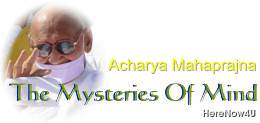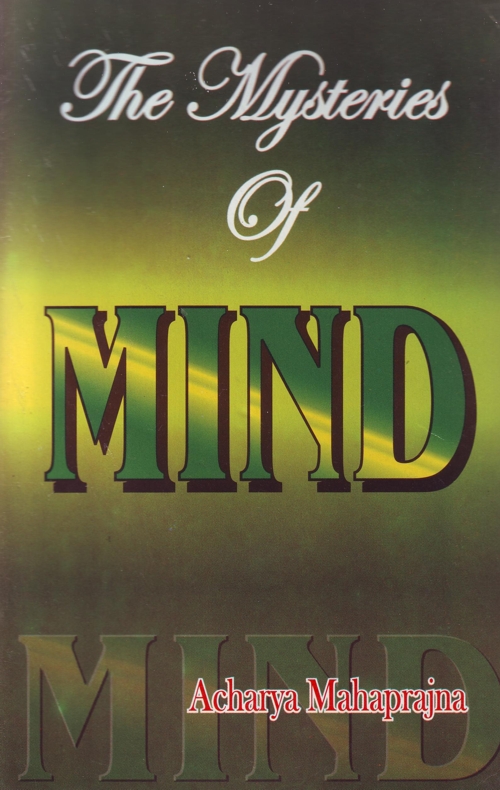
Let us consider the value of preksa meditation in the above context. Can preksa meditation take the place of medicines and drugs? The question can be answered in the affirmative. The small experiments that we do in the course of the exercises in this meditation can achieve that which medicines and drugs cannot. The question we have to consider is how to give rest to the minds of the patients or in other words how to stop the thinking process. Kayotsarga, more than any other method of treatment, gives complete rest to the brain and comfort to the nervous system. Neither medicines nor electricity can do so. Meditation can bring the mental processes to a halt. Preksa meditation is svasapreksa meditation (meditation on breath). When the mind is engaged in perceiving the body and its constituents, the external framework of reference of mind comes to disappear. If we could engage ourselves in preksa even for half an hour, we shall be certainly benefited. It is capable of achieving much.
Emperor Bharata achieved great powers through preksa meditations. One day, having washed himself and having put on his clothes, he went into the adarsagrha made of glass. The looking glasses in this house reflected every object. Bharata saw a number of reflections and one of them attracted his attention. He cast a long glance on it without twinkling his eyes. Preksa meditation began. He became lost in meditation while watching his own reflection in the glass. After perceiving his gross-body for some time, he began to perceive his subtle body. He perceived in his subtle body the fruition of his past deeds (karma). It was a new and strange world he perceived. He kept his gaze fixed on the reflection and whatever modifications it assumed. He perceived the auspicious turns in his mind and lesyas and colourations in his unconscious mind. A stage then arrived at which he perceived his consciousness completely revealed. The alien matter which bad clouded his vision and all the shackles, which had kept his self bound, suddenly disappeared. He finally entered into a state of pure knowledge and perception. His old personality became transformed into an entirely new one. In other words, he was spiritually reborn into a new life. In place of Bharate Cakravarti he became dharma Cakravarti. This was the highest achievement of his life.
The traditional version of this event mentions that Bharata first entered into the mental state in which there is a feeling of the transitory nature of the world. When this feeling became nature, Bharata became a kevalajnani (possessor of pure knowledge). But the jambudvipa prajnapti says that during the course of his perceiving his own reflection Bharata sank into a deep experience after having passed through innumerable conglomerations of karmas and entered into a state of pure knowledge. This brought about a new phase in his life.
The history of body perception is an old history. It began in the primitive age in which Dharma ruled supreme. In the course of time the tradition became lost. It is being reconstructed now. There is nothing new in the world. That which has grown old assumes a new form. When what has been lost to memory reappears, it is called new. The first experiment in preksa meditation was conducted by Bharata. This experiment remained hidden for a number of centuries. We have reconstructed it. It is a simple process of meditation. A complicated and difficult process of sadhana does not become popular. Man by his very nature avoids that which is difficult. Preksa is a simple form of meditations.
The consequence of preksa meditation is the development of the feeling of equality and of consciousness free from duality. This is a new phase of consciousness. The feeling of the duality of gain and loss, pleasure and pain, which disturbs, deforms and defiles the mind, comes to an end in this phase. Pain and grief are the products of the dialectical operation of the opposite forces of life. A dear son who does not earn and often suffers losses makes his father disgusted with and enraged by him. His love for the son becomes suppressed by anger. This is because the father's mind is conditioned by the experience of pleasure and pain and loss and gain. If he has three sons and only one of them earns, he will be more attached to and affectionate to the earning son. He will disregard the other two and become averse to them.
The awareness of duality creates many problems, which have no end. Power and knowledge when opposed by ignorance and passions often fail. If we desire to become free from grief and sorrows and other problems, we will have to put an end to the sense of duality.
No body likes perplexing problems. That is why he is eager to do away with the feeling of duality. There will be no end to grief and sorrows so far as duality continues. Hence the need to get rid of them.
There is a natural inclination in man to look beyond material objects and pleasures they give. Those who live a life of poverty and want to remain unaware of this inclination; their energies are solely directed towards earning the material means of life. But those who have tasted material pleasures show an inclination to see beyond the material world. Pleasurable experiences are always followed by painful situations and unpleasant feelings. The more one acquires material amenities, the more does he realise that a sea of worries lies ahead. Hence his search for lasting joys which can bear fruit only by a unity of experience.
Every body remains surrounded by anaura or a circle of light. This light is visible around material objects also. Every nonliving object or gross body also emits rays of light. This is the principle on which photography works. A man even when he has left the place he had occupied can be photographed at the place he has left in absentia. If the light around men and objects were not there, the object or the man cannot be photographed. We cannot see the aura.
However there is a method of perceiving it. Sit down in a dark room in which no ray of light can enter from outside and try to perceive your hand. You will not be able to perceive it, but you will certainly perceive a faint glow of light around it. If you raised both of your hands, you will see light passing from one to the other. There is another well-known method. Let two persons sit in a dark room at a distance of twelve thirteen feet from each other. They will not be visible to each other. But if they are naked they will be able to perceive each other's aura, which could not have been perceived in the light. The same holds true about the inclination towards consciousness, which is an immaterial entity. When the darkness (ignorance) caused by sensual pleasures becomes thick, one comes to feel a strong desire to go beyond empirical experience and to experience a state of undivided consciousness. This consciousness is called samayika. It results in a complete restraint of mind and its fickleness. A new life then begins in which there are no anxieties, grief and sorrow.
 Acharya Mahaprajna
Acharya Mahaprajna

